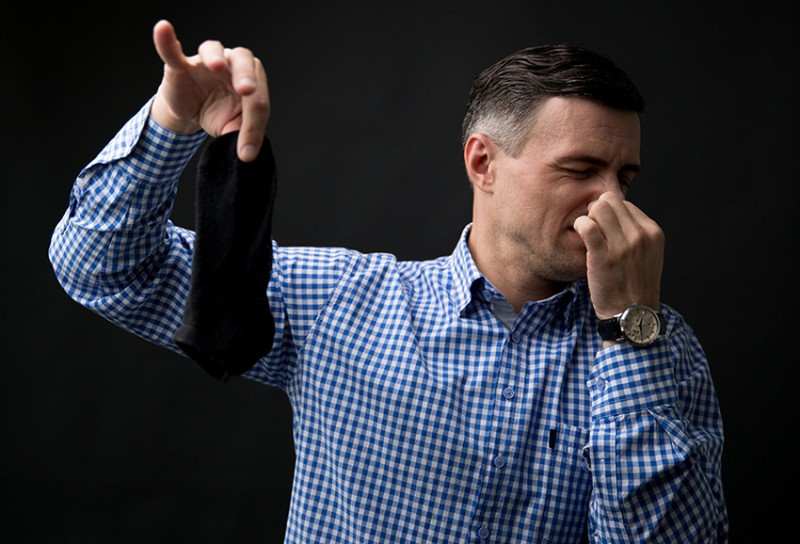We all have had it at one time or another to one degree or another. We might not be aware of it, although anyone within 10 feet notices it and is perhaps repulsed by it. Pieces of food (i.e. lettuce) stuck in our unbrushed teeth? An ugly tie? No and no. For the purpose of this article, the culprit is body odor, commonly referred to as B.O. B.O. can raise quite a stink without speaking a word, and it can be quite an embarrassment (or not, unfortunately) for the carrier. How many of us have arrived at work on a sweltering day already sweating, maybe even profusely, and taking a discreet (?) quick sniff under an armpit to assess the damage, hoping against hope that for the next eight or nine hours to make it through the day without hearing the awful news—that we are smelling up the office? Body odor usually shows up when we hit puberty, which is typically 14-16 years of age for females and 15-17 for males. What we are smelling (or in denial about) is the scent our bodies give off, according to medicalnewstoday.com, when bacteria on our skin break down the protein in our sweat into certain acids. A couple things to get out of the way here: the sweat itself is virtually odorless to humans, and that B.O. smell is NOT isolated to the bacteria growing on our body. Here's the kicker, or the stinker: the average human body has three to four million sweat glands, and there are two types. The simpler type are eccrine glands found wherever we have skin and which are tasked with regulating our body's temperature. Then there are apocrine glands, located in the breasts, genital area, eyelids, armpits and ears. These usually produce an odor, hence the sniff-the-armpits reflex when around others. Another thing sweat does is remind us we are an animal, and you can read into that what you will. Fair enough, but consider this: humans have distinct odors, just as we do fingerprints—scientists call this our "odorprints." This is how dogs can track fugitives on the run (think Sylvester "Rambo" Stallone or Harrison "The Fugitive" Ford), and why, says prevention.com, perfume smells slightly different on one person than it does on another. It gets better. Prevention.com also says studies have shown increasing evidence that "opposites really do attract"—that we, the people, are drawn to potential romantic partners with a body odor different from our own. And yes, such research has included female test subjects sniffing T-shirts bearing a body odor chemically different from their own. Finally, any change in our odorprint can, to a dog, signal fear, and, to a doctor's examination, be a sign that there has been a change in our health, such as the presence of prostate cancer. Now that stinks! As for that run-of-the-mill B.O., the kind that sticks to you from the time you end your gym workout to when you hit the shower, webmd.com offers six tips for reducing body odor, most of which you should already know (if you know what's good for you and those around you): 1. Keep yourself squeaky clean: Shower or bathe at least once a day (twice if you work out in the afternoon or at night), and wash yourself thoroughly, especially in those places where the apocrine glands are found. 2. Use antibacterial soap: It will cut down on the bacteria count and therefore reduce the chances for body odor. 3. Towel off thoroughly: Keeping your skin dry will make it that much tougher for the bacteria on your skin to breed. 4. Apply "industrial strength" deodorants or antiperspirants: These are available without a prescription, but you can also ask your doctor about prescription products. 5. Keep your wardrobe squeaky clean: That doesn't just mean changing underwear daily. Good grief, you should be doing that already. Change clothes when sweating heavily, as fresh clothes keep the body odor down. This goes for socks as well. For shirts or blouses during the hotter months, especially, this might mean more frequent washings and trips to the dry cleaner. 6. Cut down or eliminate "offensive" foods or drinks: What you eat and drink can have an adverse effect on how you smell. Spicy foods such as hot peppers or drinks with caffeine (coffee) make you sweat more, and the aromas of food such as onions or garlic can seep into your body odor. One last thing—a change in how you sweat or smell might be a clue you need to see your doctor. Mayo Clinic suggests a doctor's visit for any of the following:
- You suddenly begin to sweat much more or less than usual.
- Sweating disrupts your daily routine.
- You experience night sweats for no apparent reason.
- You notice a change in your body odor.

